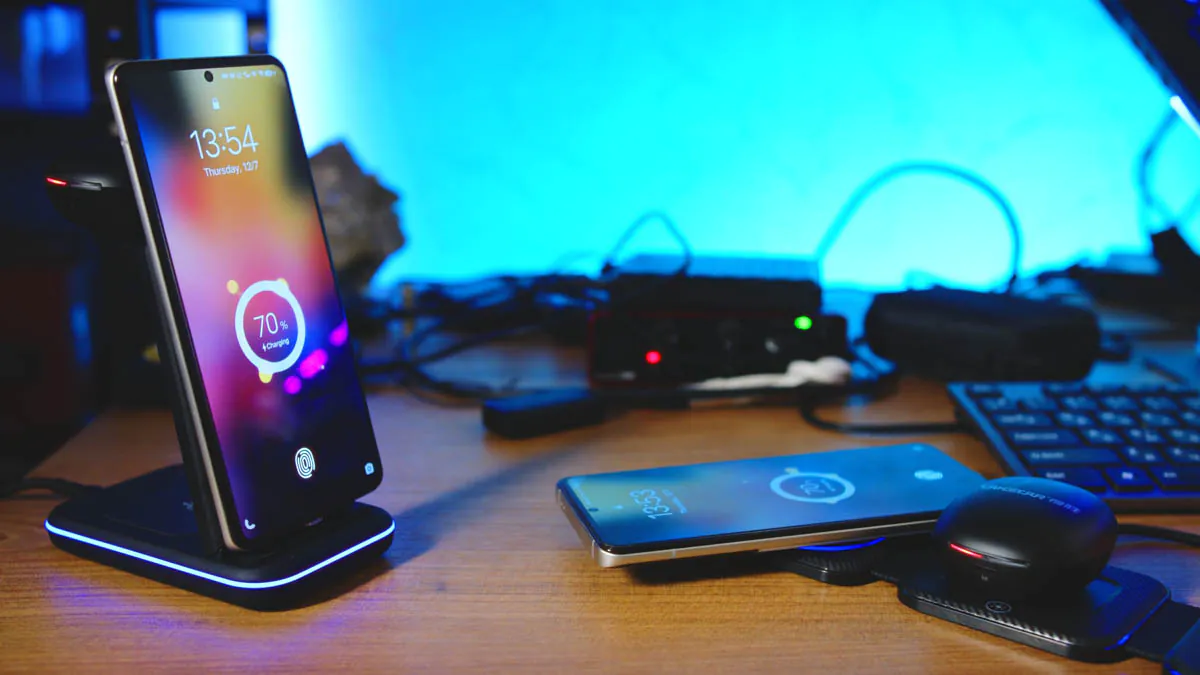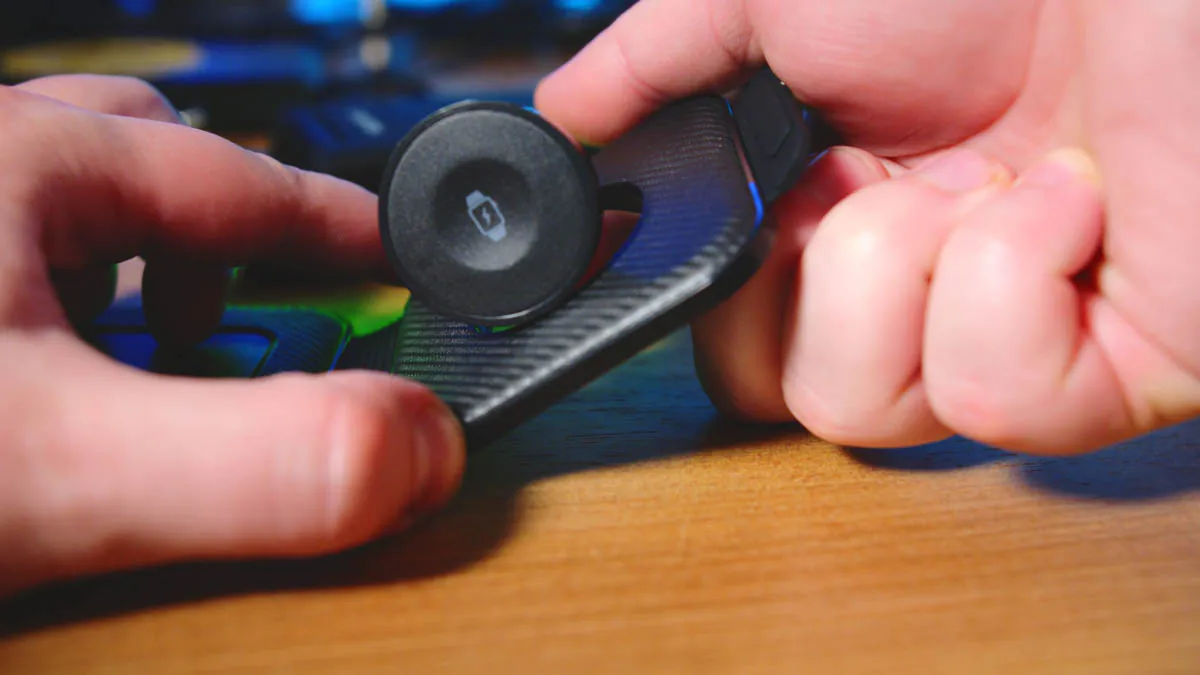© ROOT-NATION.com - Use of content is permitted with a backlink.
Against the backdrop of news about the upcoming release of smartphones supporting the Qi2 standard, devices with Qi1, or simply Qi, have once again sparked public interest. So, today, I present wireless chargers for testing: Canyon WCS-304 and Canyon WCS-305.
 Video review of Canyon WCS-304 and Canyon WCS-305
Video review of Canyon WCS-304 and Canyon WCS-305

Market positioning
Let’s start, as always, with the price, but here’s the strange thing. Despite the roughly similar cost, around $35, we have a clearly huge difference in positioning. Although both chargers support up to three devices simultaneously, with almost identical speeds, that’s where the similarities essentially end.

We’ve already had a partial review of the Canyon WCS-304, but there the main stars of the show were wireless headphones. In particular, the TWS-6 and TWS-8. By the way, I used the latter for over 6 months. Which, for arguably the cheapest headset on the market – is pretty cool, wouldn’t you agree? Review [link here].

Qi and Qi2
At the same time, the benefit from either of these models will not be maximum if you have exactly THREE devices supporting wireless charging. Because the maximum power will be divided by the number of charging devices. Do you have a watch, headset, and smartphone? To charge the latter as quickly as possible, you will need to remove all the others..

And here, I’m getting back to Qi2. The news about this standard has revived interest in wireless charging because there are essentially two options on the market now. These are the slow but widespread Qi and MagSafe with a speed of up to 15W. And… all the rest.

When I say all the rest, I’m lumping together Xiaomi, VIVO, Oppo, and everyone else on the market. Because they all have significantly more power than Qi, but with their absurd cost, they are compatible with one or two smartphones, which greatly negates their usefulness. If such a charger is not included in the package – I do not recommend buying it. It’s better to get a charging block and an official cable.

Because when we talk about any charger faster than Qi or Qualcomm Quick Charge 3.0 with 15 and 18W respectively, we are talking about charging speeds usually less than an hour. This is either 50 or 60W. But exclusively for one or two devices, usually flagships.

With Qi2, everything will be simpler – maximum power up to 36W and a more secure attachment, similar to MagSafe, will extend the standard significantly beyond Qi.

Usefulness
It’s simple. If your smartphone supports such charging, you will almost never be caught off guard by the lack of electricity with a drained smartphone. The smartphone sits on a wireless charger like the WCS-304 as on a stand, and therefore, it will always be charged. It will always be nearby and in one place.

This applies less to the Canyon WCS-305, as this device is more geared towards travel. But its advantage lies in compactness and versatility at the same time. Because, as you can see for yourself, it can be folded into a pyramid, and thanks to the rubberized foot at the bottom, you can place a smartphone on a surface for charging, though less securely than on the WCS-304.

Technical specifications
However, don’t expect miracles. Whether it’s the 304 or the 305, they cannot charge all three devices at 15W speed. The WCS-304 has a limit of 18W for everything, while the 305 has a limit of 15W. This means that when charging headphones and a watch, the smartphone will receive either 8W or 5W. This won’t let the devices discharge, which is useful, but a modern smartphone will charge very slowly.

And yes, some of you may remember that smartphones have a minimum official charging power. For the iPhone 15, for example, it’s 20W, but even for older smartphones, it existed. And here’s the nuance – it applies ONLY to wired charging. Wireless devices will always charge the device. And if you need to charge your smartphone quickly, just leave the other slots unoccupied.

Both models also have a huge, HUGE advantage over their counterparts. It’s the presence of a charging block in the package. And the cable, of course.

WCS-305 also comes with a separate carrying case – where both the charging station, the cable, the charging block, and even more can fit comfortably.

And let’s not forget about several layers of protection – against overload, overheating, and excessive current. So, you place your devices and don’t worry about them discharging or burning out. The power here is also not something to worry about.

Appearance
Also, since, unlike charging blocks, wireless charging stations (that’s what the abbreviation WCS in the name means) are placed on the table, in a prominent place – they better look attractive. And WCS-304 is noticeably ahead in this regard.

The station looks elegant even when using ALL wireless slots and is available in one of four colors, essentially suitable for any workspace.

Also, don’t forget that the WCS-304 serves as a smartphone stand and helps organize your workspace. All your gadgets with wireless charging will be here, always ready and charged.

However, if your gadgets are exclusively low-power, the advantage goes to the WCS-305. Because this charger can truly be a family one, designed for the wireless headphones of several people. Or watches. After all, the 304 version has specialized slots, while the 305 is entirely universal.

What did I choose personally? Canyon WCS-305. I adore compact universal things, and in the future, my arsenal of wireless devices will only grow.

I have already reviewed a flashlight where wireless charging was the ONLY means to recharge the battery without a proprietary charging block. We’re talking about the Wuben X3 Owl.

Summary
If your smartphone supports wireless charging, it’s worth using it. Just to ensure that your smartphone is always fully charged. Whether you choose the elegant and reliable Canyon WCS-304 or the compact and versatile Canyon WCS-305 is not crucial. The main thing is to take care of yourself.
Read also:
- Canyon DoubleBee GTWS-2 TWS Headphone Review: Not What It Looks Like
- Canyon Semifreddo SW-61 review: An elegant and affordable smartwatch
- Canyon DS-90 Review: Updated universal USB hub

